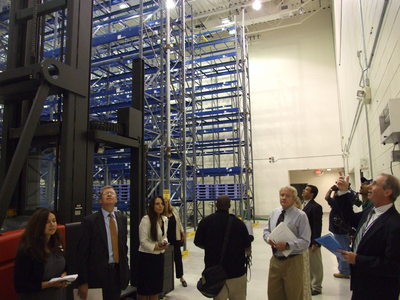More offices moving to ex-Pfizer campus in Ann Arbor as U-M seeks new corporate partnerships
Partnerships between academia and the corporate world may eventually take up 20 percent of the 30-building, 174-acre ex-Pfizer campus the University of Michigan acquired last year, U-M President Mary Sue Coleman said Wednesday.
“It’s going to be mostly academic,” Coleman said. “I don’t have a percentage, but I wouldn’t be surprised if at some point we got up to 20 percent that was public-private partnerships.”

Former Pfizer site leader David Canter (far right), recently hired to lead the ex-pharmaceutical campus for the University of Michigan, is pictured leading a tour Wednesday in a chemical storage room inside the drug manufacturing complex at the site.
Nathan Bomey | AnnArbor.com
Coleman confirmed previous reports that the university is pursuing a public-private partnership for the massive 233,530-square-foot drug manufacturing complex Pfizer left behind when it abandoned the complex in 2008. She also said that U-M will move its Business Engagement Center and Technology Transfer Office to the site within the next few months.
Coleman, discussing her vision for the site after a press conference Wednesday, said the university is actively seeking to partner with outside companies at the site.
“We want to be seen as the innovation place, the place you can get things done,” she said. “It’s our outward face to the world. I’m just so committed to helping Michigan turn around and for us to be part of it. We have to create the buzz, (so that) this is the buzz about what’s happening in the Midwest, and we want to be in the middle of that.”

Melanie Maxwell | AnnArbor.com
Coleman’s statements come as the university is gradually filling the 2 million square feet of facilities it acquired for $108 million during the height of the financial crisis.
The university on Wednesday said it had signed a lease with the first commercial tenant for the site, a Michigan State University chemical products startup called BoroPharm Inc. The firm’s move to the site sets the stage for more companies to seek out space there.
“We learned through the process about how to do these leases because it’s the first time we had done it, so we’ll get better at it,” Coleman said. “As we get more press about that opportunity, maybe others will come to us. So I’m excited about it.”
To be sure, U-M still plans to use most of the ex-Pfizer site for its own research initiatives, including new multidisciplinary projects in areas like nanotechnology and imaging systems.
In addition, the university plans to eventually use some of the space to house startup companies led by its own faculty members.
U-M has said it plans to add 2,000 to 3,000 jobs at the site within 10 years.
But the university is taking a methodical approach to plotting the site’s future. So far, the university has moved 300 employees to the site, which once housed 3,000 Pfizer employees.
“We don’t want to grow it too rapidly because we don’t want to make bad decisions,” Coleman said. “So there’s this balance between making the best decision, making the best strategic vision and getting the site up and running.”
Among the next groups to move to the site are the Tech Transfer Office and Business Engagement Center, which are currently located in the Galleria Mall on South University. It’s the second move in as many years for those offices.
“They’ll be out here, so there will be a lot more activity,” Coleman said. “People will be coming here to do their patent work, to do all their tech transfer and licensing and that’s going to be another group of people, a critical mass.”
The site’s repositioning is being led by former Pfizer site leader David Canter, who started his new job Monday.
“The hiring of David Canter is critical because he now drives the process,” Coleman said. “He knows the site very well because he ran it for a number of years. We could have almost not gotten a better person to do this, working with faculty groups and other administrative leaders to make the best decisions.”
Contact AnnArbor.com's Nathan Bomey at (734) 623-2587 or nathanbomey@annarbor.com. You can also follow him on Twitter or subscribe to AnnArbor.com's newsletters.


Comments
Lady Audrey
Thu, Jul 22, 2010 : 6:08 p.m.
You want a fat income tax? Seriously, as the new campus is filled up, whether with companies or university people, they will eat at our restaurants, buy gas and groceries on their way home and generally keep our vibrant downtown hopping. Pfizer didn't pay their fair share of taxes, always getting breaks as they threatened to abandon the site. I think we can feel good that U-M won't abandon Ann Arbor and we are the better for it. Go Blue! Not that impressed that the new head is from Pfizer, but apparently the president likes her ties to pharmaceuticals, like her Johnson & Johnson fat paycheck.
Lokalisierung
Thu, Jul 22, 2010 : 4:02 p.m.
"However new jobs do produce income tax dollars..." I wish they there was a fat income tax around here.
Belgium
Thu, Jul 22, 2010 : 12:31 p.m.
I don't believe that empty buildings generate tax dollars. However new jobs do produce income tax dollars and also fund other nice things around here like business and services that cater to the business. Perhaps you could have been more persuasive and convinced Pfizer not to close up shop, but once that happened, your moans about loss of tax dollars is just townie whine.
kenUM
Thu, Jul 22, 2010 : 11:55 a.m.
For those of you who believe that U-M just sucks the life and resources out of Ann Arbor, I invite you to use this link and take a look. One thing to remember is that without the U-M; Ann Arbor would not be the City that it is today. http://www.umich.edu/~govrel/community_guide/partnership.html#ts
FifT7
Thu, Jul 22, 2010 : 9:58 a.m.
Thanks for the "links" Nathan. Unfortunately, the articles answered my questions. I guess I will write another letter to the Governor & State Legislators to request them to stop bank-rolling this "semi-private" University. For every "new" tax dollar the U takes off the rolls and/or any tax dollars they "innovatively" save private companies, the State should deduct it from the U's appropriations. And then, the State can refund it directly to the City of Ann Arbor. I now it's a shell game, but the tax-payers need to compete too!
Nathan Bomey
Thu, Jul 22, 2010 : 8:54 a.m.
@FifT7 In this column, AnnArbor.com business news director Paula Gardner discusses the tax and commercial real estate implications of the University of Michigan as a landlord. http://www.annarbor.com/business-review/post-83/ I also discussed this in my story yesterday on BoroPharm's move to the North Campus Research Complex: http://www.annarbor.com/business-review/university-of-michigan-gets-first-commercial-tenant-for-former-pfizer-site/
FifT7
Thu, Jul 22, 2010 : 8:21 a.m.
I do not know the tax laws, but when UM bought the old Pfizer property, Ann Arbor lost a key tax payer. So, I certainly hope these private companies (now "leasing" space from UM) are actually paying property taxes. Otherwise, I can understand just how "innovative" the U is in facilitating a tax loop-hole.